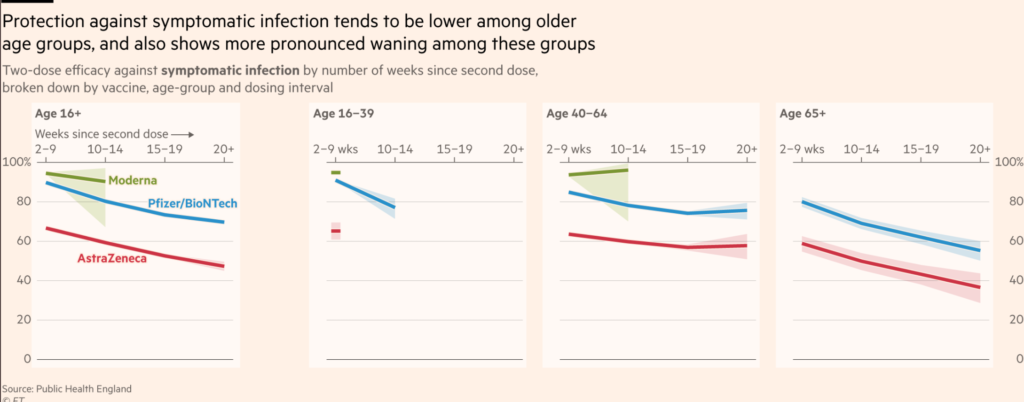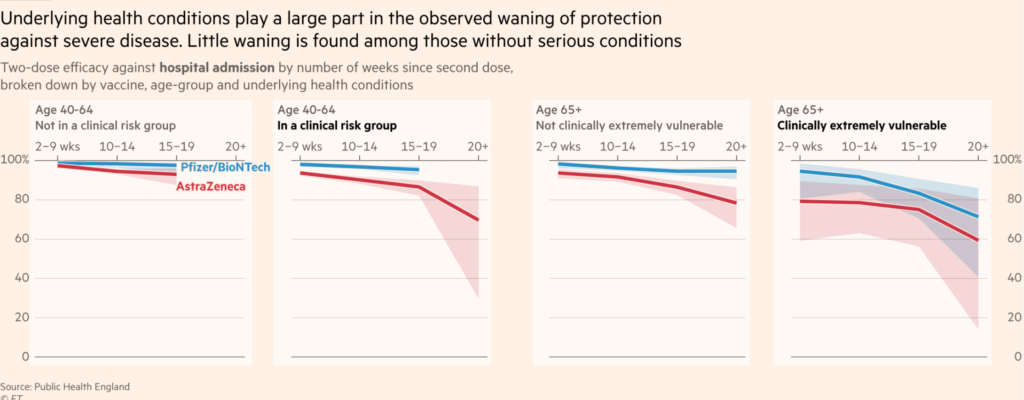Vaccines
I mentioned a study from England yesterday which looked at waning immunity. This tweet thread looks more closely, and there’s good stuff in the report that I missed. First, here’s the original study.
Yes, it looks you’ve got a significant loss in effectiveness against infection if you look at the over-sixteens, but if you take the really old people out, it gets a lot better. There’s not much data for the 16-39 year-olds, which is a pity, but look at the 40-64 year-olds! They have hardly any drop.

And, except for the over-80s, there’s very little drop in effectiveness against hospitalization:

And if you don’t have comorbidities, there’s even less of a drop:

It sure doesn’t look like you really need boosters unless you are quite old and/or clinically extremely vulnerable. (Note: The UK had long dosing intervals, more like Canada than like Israel or the USA.)
Also, I want to note that the study looked at health records, so people who were in the control arm of the study could have had an undiagnosed COVID-19 infection, granting them some immunity — which would make the relative effectiveness of the vaccine look worse.
An anxiously-awaited preprint from Israel came out today, and says that shortly after a booster, the risk of infection went down by 11.3x and the risk of hospitalization by 19.5x.
A Moderna press release says their vax effectiveness against infection diminishes over time. The incidence of infection was 36% lower in people vaccinated a median of 8 months earlier than in those who were vaccinated a median of 13 months earlier.
This preprint of a large, multinational study says that Pfizer works pretty dang well: 91.3% over the course of six months. They did find a drop in effectiveness from 96.2% seven days after the second dose to two months afterwards, dropping to 83.7% for four months and later. Notably, in South Africa, which has lots of Beta cases, Pfizer was 100% effective at stopping infection (although it was a smallish group).
This preprint says that a severe headache 5-20 days after a vax is frequently a precursor to Vaccine-Induced Thrombotic Thrombocytopenia (AKA blood clots). So if you know someone who gets a splitting headache 5-20 days after J&J or AZ, get them to a hospital immediately and have them tested for VITT precursors.
This preprint says that the antibodies that adenovirus vector vaccines (like AZ and J&J) that lead to Vaccine-Induced Thrombotic Thrombocytopenia go away over time, and that it’s safe to give another shot of that vax afterwards. 90% of people with those antibodies have cleared them by 12 week. (It’s also totally safe to give an mRNA to someone who has a bad reaction.)
This preprint says that antibodies increase by a lot (like 5x) after a third shot, especially antibodies against variants (like 15x).
Transmission
This preprint says that people with active COVID-19 cases breathe out virus in both fine and coarse particles, and get it on their phone. Alpha cases had much, much more virus in their breath than COVID Classic — 18x in coarse particles and 43x in fine particles. (They assume Delta is even worse, but didn’t have data for Delta.) Masks reduced virus in fine particles by 48% and in coarse particles by 78%; cloth masks and surgical masks were about the same.
Recommended Reading
This thread talks about immunity and transmission and why a nasal vaccine would probably reduce transmission more.
This article explains why long-term effects of vaccines are hugely less likely than long-term effects of drugs.
This thread talks about HEPA filters, including how to construct your own free-standing HEPA filter.
